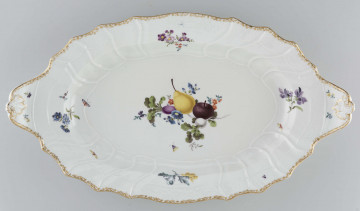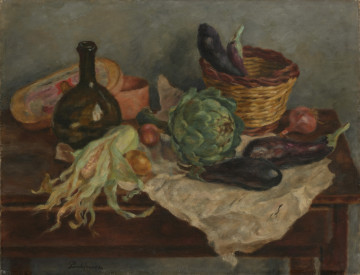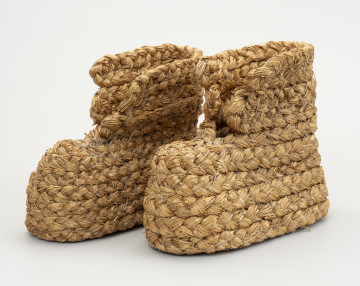
Platter
1745 — 1750
National Museum in Lublin
Part of the collection: Basketry
One way of storing sorted cereal grain was in straw baskets. These baskets were barrel- or cylinder-shaped. They were made of rye straw, the only straw suitable for a variety of products, from small items such as Christmas tree decorations, smaller and larger containers, or shoes, to thatch roofing. To make the straw sufficiently durable and long-lasting, it must be scythed so as not to break the ears while they are still green and without seed germs. Once it has been cleaned of its leaves and nodes, it should be dried in sheaves in the sun so that it fades and gets its characteristic fawn colour. Immediately before use, straw can be boiled for a while, which makes it more malleable. When starting to weave, a bundle of long straw ears had to be tied together and twisted into a kind of relatively loose twine of equal thickness over the entire required length. In order to maintain this thickness, a bent sheet was used, which was moved along the length of the twine as it was being worked. Sometimes, instead of twisting the strand, it was simply plaited, adding more stalks to maximise the length of the prepared rope. Layers of spiralled straw ropes were joined together using willow (wicker), aspen or juniper strips. A basket made in this way, sometimes up to 120 cm high, could be used not only for storing grain, but also for storing fruit and vegetables. Iwona Karwowska
Author / creator
Object type
basket
Technique
coiling (weaving)
Material
straw, wicker
Origin / acquisition method
donation
Creation time / dating
Creation / finding place
Owner
Muzeum Narodowe w Szczecinie
Identification number
Location / status

1745 — 1750
National Museum in Lublin

około 1924
National Museum in Szczecin

1900 — 1950
National Museum in Szczecin
DISCOVER this TOPIC
Castle Museum in Łańcut
DISCOVER this PATH
Educational path